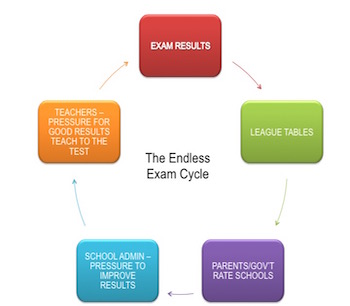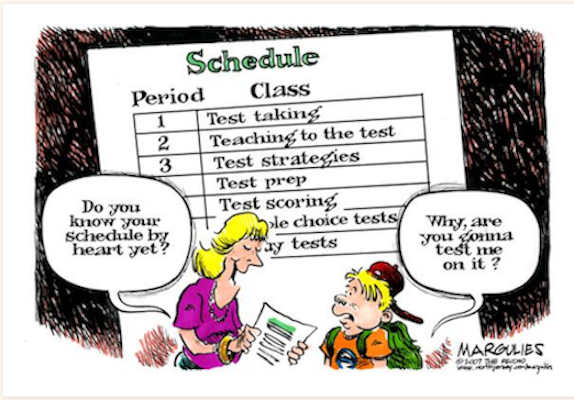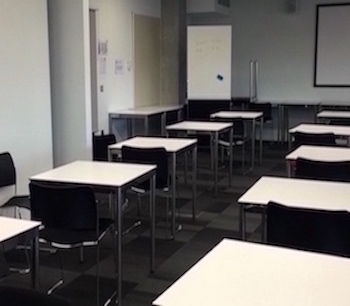Part One: The Endless Exam Cycle
The short term thinking of current UK mathematics assessment

“It’s not the math that the kids need to learn….it’s how to approach a problem in the world and see it through to its solution”
Jonathan Hamilton, Teacher of Mathematics
Many parents, schools, and teachers think that students should take mathematics. They consider it important, but for 15 to 19 year olds the UK public school system fosters a culture of exam writing by making standardised exams the only method of evaluation for mathematics.
When will we ever need this stuff?
“When will we ever need this stuff?” is a common question asked by pupils in maths class, as many feel that they are memorising algorithms and not really seeing any point to what they are doing. Even students taking A Level Maths think that the objective is to allow them entry into Science, IT, and Business programmes but there are more important reasons for doing mathematics and these things affect many aspects of our life.
Jonathan Hamilton, teacher at the Canadian International School of Hong Kong, thinks that,“It’s not the math that the kids need to learn….it’s how to approach a problem in the world and see it through to its solution”
According to a study by Oxford University, 47% of U.S. jobs are at risk due to computerization and the researchers believe that this extends to all developed countries. Jeff Selingo, author of the New York Times best seller, There is Life After College, feels that the education system should “supply students with the problem-solving abilities and communication skills critical to the workforce of the future.”
The ability to problem solve seems to be the key to the future for our pupils. The current method of standardised exams and the emphasis on the results is not an indication of problem solving skills since these types of exams “mainly reward rote learning, bias both teachers and learners towards rehearsing fact-like information” according to Newton, in his book Teaching for Understanding. He goes on to mention, that mathematical algorithms are time saving routines but points out that the mechanical procedures of maths may end up dominating understanding.
The purpose of teaching mathematics is not just, “children thinking it is important because they have to get their GCSE Maths and then they can forget about it and then never do any maths again.”, according to Anne Haworth, chair of the general council of ATM (Association of Teachers of Mathematics). This frustrates her as she feels that it is an important subject, not just for calculation, but it gives people the ways of logical thinking, planning, and organising.
UK Current Maths Assessment
The GCSE and A Levels maths grades are based on standarised exams worth 100%. The exams are run by several different examining boards that are regulated by Ofqual (The Office of Qualifications and Examination Regulation).
Mathematics learning is much more than passing an exam. The emphasis put on the exam results by the community tends to sanction us to forget that.
By ignoring the more important aspects of mathematics, such as problem solving, we are not giving our children the tools to go into the future.
Why are we evaluating mathematics by an exam instead of teaching problem solving?
Many teachers attempt to introduce the understanding of mathematical concepts in the classroom but feel hindered by the system. Paul Dickinson, former maths teacher and Senior Lecturer in the MMU Department of Secondary Education, feels that the current UK method of standardized exams being worth 100% of a student’s mark exists because no one has come up with a different idea. He suspects that it is because this method is least open to abuse and it satisfies the things that we worry about, such as validity and liability. He says that “ if you have a system that is so hugely dependent on the final outcomes….for example, league tables and almost everything a school is based on is their examination results, if you are going to make it that important, then I do not know what other system you could use that is better, but that is not to say that I think it is a good system.” He feels that we have become very adept at preparing students for exams.
The history of how we became an exam society
The UK has a long history of education with the first grammar school being established in Canterbury in 598 according to Education In England: a brief history by Derek Gillard. By 1775, the industrial revolution created a demand for mass education and in 1886, Thomas Wyse, introduced the idea of a national system of education. In 1913, the Acland Report called for an external exam for 16 year olds – the Examination for the Secondary School Certificate, but even then the exam was proposed to be mainly written but also include practical and oral elements and it was stated that a student record should include more than just exam results.
A discussion document presented by HMI (1982), Her Majesty’s Inspectors, demonstrated that much teaching in A Level Maths “left little scope for mathematical thinking, problem-solving strategies or opportunities for the student to surprise the teacher with a novel solution.” This seemed to be trying to put things on the right track but The Waddell Report (1978) suggested a new single exam system for 16 year olds, the General Certificate of Secondary Education (GCSE), which was implemented after the HMI document. The report also stated that arrangements for central coordination of 16+ examinations should be strengthened. By 2012 a report by CESC (Commons Education Select Committee) examined the process for The Administration of Examinations for 15-19 year olds in England. They found that in 2011, that there was a marking of 15.1 million exam scripts in that age group with a concern of the narrowing of teaching and learning and “teaching to the test” as an impact of the accountability system with the use of past papers and mark schemes as “education becomes increasingly centred on passing exams.” It quotes Dr. Ian Jones of the University of Birmingham as saying that exams “fail to gather evidence of the very conceptual knowledge and higher order thinking skills that our country values and needs”.
But the recent government’s White Paper (2016) still suggests publishing “school performance data to inform school choice and help parents and governing boards to hold schools to account” and the DfE (Department for Education) publishes School Performance Tables using the exam results from GCSE and A Levels as the criteria for a school ranking. It seems that the government is not listening to the experts.
Teaching to the Test
Definition – Teaching to the Test
To focus instruction on the topics that are most likely to be tested or to spend valuable instructional time prepping students for tests rather than teaching them knowledge and skills that may be more important.
from Edglossary
With all of this emphasis on exam performance, teachers and school leaders are being pressured to teach, “what you have to do to get a particular mark”, according to Anne Haworth of ATM. She continues to say that it encourages short-term success and long-term lack of understanding as the mathematics that they learn in that way will not be an effective tool to be used in their everyday life.
Rachel Henshall, Head of Mathematics at Barlow RC School in Manchester, agrees and says that teachers are expected to meet the targets. There have been criticisms if GCSE exam questions are not introduced into the class as early as year 9. Under pressure students are being told “you must know this for GCSE and there is no love of mathematics.”

Paul Dickinson of MMU adds, “I think that it is fair to say that A Level teaching in this country, almost became, that every time you went into a lesson, they were either preparing for a test, doing a test, or going over a test. It becomes a totally dominant thing for two years,” and Julian Thomas, Master of Wellington, summarises the results of a study by Oxford University by suggesting that the UK is among the best or worst (depending on your point of view) of teaching to the test as the pressure of exam results prohibits pupils from learning deeper understanding.
This produces what feels like a never-ending cycle. Parents and the government rate schools based on exam results and the school administrators feel pressured to have the best schools, who then put pressure on teachers to produce these good exam results and then, the teachers, to give the students the best chance, end up teaching to obtain high exam results. Teachers know that this is not right but they find it very difficult to stop the circle. If mathematics is the key to a future society that requires problem-solving skills, this cycle must be broken.
“If you are going to have such high stakes, then inevitably it becomes, we will do whatever we have to do to get these results.”
Paul Dickinson, Senior Lecturer MMU Department of Secondary Education
Learning and Assessment: Summative v Formative
Problem solving requires more than collecting information and learning algorithms. It requires being able to take the information and apply it to new situations. The exam status quo is summative as opposed to formative
Many mathematics teachers try to include formative learning into their classroom and have good intentions. The writing of a past exam can be considered formative as long as students are engaged in the learning, try different approaches to find a solution, discuss possibilities, and get feedback on their work and are not just handed a marking scheme. The huge amount of course work expected to be covered, along with the pressure of performance has these good intentions being overcome by just teaching how to do a particular type of question and not really worrying if students understand it.

Even when teachers have the motivation and ability to teach understanding and problem solving, they do not always have the freedom to teach that way. As Rachel Henshall points out, she likes to inspire her pupils to enjoy maths and encourages them to try out different things. She wants to give them the confidence to make mistakes to help make them become better problem solvers, but she is always conscious of the fact that there are these assessments. She tries to put enjoyment into her maths lessons, but “you are under pressure to fit all the things from their curriculum into the school year.”
In Teaching for Understanding, Newton points out if there is a “press for large quantities of knowledge, understanding will be squeezed out…..too much content inevitably leads to memorization……time is what understanding needs.”
We need long term solutions – not short term thinking
Changes are occurring in the makeup of GCSE and A Level Exams. Modules are being eliminated in the A Levels so students will have an ‘end of course exam’ instead of different parts of the course being taught separately with multiple opportunities for retakes. Anne Haworth of ATM, feels that under the module system, students did not get an overall understanding of mathematics and the new system may encourage “teaching it more as a unified subject”, but she thinks that it is all happening too quickly giving students and teachers not enough time for preparation. She believes that the government’s answer to education is the assessment system and decisions that are made involve short-term thinking.
We are no longer training people to work on assembly lines. We need thinkers and problem solvers as most jobs are constantly evolving or being eliminated. The main problem is changing people’s thinking about the importance of the final exam and challenging the system to make it a priority to alter the way we think for the future of the students and for the UK’s economic competitiveness.

PART TWO:
THE ENDLESS EXAM CYCLE CONTINUES!
Who is to blame?
The emphasis on a final mathematics exam result for our 15 to 19 year old students has come about for many different reasons.
To implement change, an analysis needs to be made on some of the causes of why it continues.
